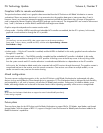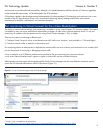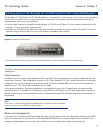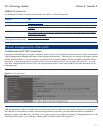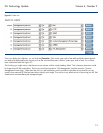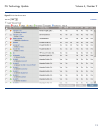ISS Technology Update Volume 6, Number 9
9
Question #3________________________________________________________________________________
Q. Is it required to use a connection broker in a VDI environment?
A.
No. Many customers implement VDI without using a connection broker. The ability to hand an end user a dedicated
resource may make sense in smaller environments, developer environments, and in Business-to-Business (B2B) connections.
As the environment grows and becomes more complex, the disadvantages may then be more pronounced in a non-brokered
environment. Items such as centralized management are invariably compromised when a connection broker is absent in
large environments. Connection tracking (the ability of a connection broker to decipher whether a discreet connection is
active and functioning) also becomes more critical as the implementation grows. Insuring that an end user always has a
resource is a benefit of connection-brokered environments that is not easy to attain in a non-brokered environment. Finally, a
connection broker provides a “big picture” overview of the utilization of the VDI environment.
Question #4________________________________________________________________________________
Q. What connection brokers does HP recommend?
A.
Ultimately, HP leaves connection broker selection up to its customers. However, we do have partnerships, and where it
makes sense, HP can offer a broad range of choices based on customer needs. These choices are quickly becoming the
standard in proof-of-concept implementations. Provision Networks, HP Session Allocation Manager (SAM), and VMware’s
upcoming Virtual Desktop Manager are all available from HP for VDI support⎯and in some cases (Provision Networks and
SAM), the same connection brokers also support other technologies, such as Consolidated Client Infrastructure (CCI) and HP
Workstation Blades. For software quotes from third-party vendors, such as Provision Networks, call HP Software and
Licensing Management Solutions toll-free line at 1-800-597-4622, or access one of the URLs listed below in “Additional
resources.”
Question #5________________________________________________________________________________
Q. Does VDI support multi-monitor deployments to the end user?
A.
VDI supports monitor spanning rather than true multi-monitor deployment. The main differences are as follows:
• Multi-monitor capability allows end users to maximize an application in one window while leaving another monitor
completely available for work.
• Monitor spanning allows a single desktop to be spread across two or more physical display devices, with non-
maximized applications displaying separately on each monitor.
VDI using HP Remote Graphics Software PC (RGS-PC) edition supports monitor spanning with a cumulative resolution of
3840x1200. This allows for up to two spanned monitors, as long as the access device supports such a configuration.
Question #6________________________________________________________________________________
Q. How much memory should be installed in a system that will be a VDI host?
A.
Much like consolidation from virtualization, VDI does not have strict rules about how much memory to use; however, there
are excellent guidelines that will greatly increase the chances of a successful deployment. With regards to memory, more is
better only to a point. VMware supports up to 64 GB on a single server and up to 16 GB on a single VM. A better rule of
thumb than loading every system with 64 GB of memory is to follow a ratio of 4 GB of memory for every processing core on
a system when the virtual machines are running Windows XP. An eight-core system, such as a DL585 G2 or BL480c with
quad-core, would be outfitted with 32 GB of RAM; and a DL380 G5 with dual-core processors would be fine with 16 GB
under most circumstances.




